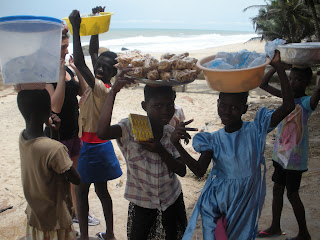I’m usually pretty busy during the week and make it home
just in time for dinner. So I only have the weekends to travel and see the rest of
the country.
The first weekend here was packed full of cool tourist
things to see. We went to Kakum National Forest, where we walked along a series
of seven rope bridges over the tops of trees. The bridges are safe but they
shake and sway when everyone walks on them.
After that, we went to a drumming and dance lesson on the beach. I was
already exhausted, so my dancing skills were even more horrific than normal…
but it was fun nonetheless.
 |
| Canopy walkway |
 |
 |
| Ghanaian girls selling snacks and water |
 |
| African Drumming lesson |
We also got to tour the Cape Coast Castle, where salves were kept until they departed to the Caribbean and America. The history is interesting yet very sad, and even to this day you can see the effects of the slave trade in Ghanaian culture. A few people I have come across are very polite and nice but are not shy about expressing their animosity towards whites about how they were treated during this time.
Since Cape Coast is located on the coast of the Gulf of
Guinea in the South Atlantic, there are plenty of beautiful beaches to relax
on. We’ve spent a few Saturdays and Sundays just lounging on the beach under coconut
trees, and swimming in the warm but very salty ocean.
 |
| one of the many beautiful beaches in Ghana |
 |
| Canoes we used to get to the stilt village |
 |
| Through the jungle |
 |
 |
| Nzulezo stilt village |
We spent the night at a very nice beach resort and even though it was raining, we didn’t mind because the temperature was very cool, enough to even be cold (we didn’t think to bring a light jacket though). It was a nice relaxing weekend, and we are already planning our next trip!
We take taxis everywhere, but the market is so crowded that
we usually get out early and walk the rest of the way. Haggling is also a must
here, I’m not very good, but I’ve been able to hold my own I think, and I’ve
made a couple friends at the booths that I can come back to and get a good
price for things.
 |
| The market where food is sold |
Ghana is a middle-income country with a GDP of around 67
billion, but has a very high government debt of over 50% of GDP. Although it
the GDP per capita is only $3,300 (US) it is one of the highest in Africa and
is also one of the fastest growing economies as a rate of 14.4% growth in 2012.
With a Gini coefficient of 42.8 (2006), Ghana has an income
distribution similar to that of the United States (measured at 45 in 2007). The
income disparities can easily be seen though. For instance, the family that I
stay with is relatively well-off, the children attend private school, we have
running water and electricity. However, those families that sell in the market,
as I have previously mentioned, struggle to purchase the most basic necessities
and other important household appliances like a refrigerator or a stove and
can’t send their children to school, even the less expensive government schools.
Then there are much wealthier families that drive very nice cars (even compared
to those in the US) and live in very large houses.
I have been doing some interesting stuff at work this past
week, look out for it in my next post!
Thanks for reading! Until next time…





No comments:
Post a Comment